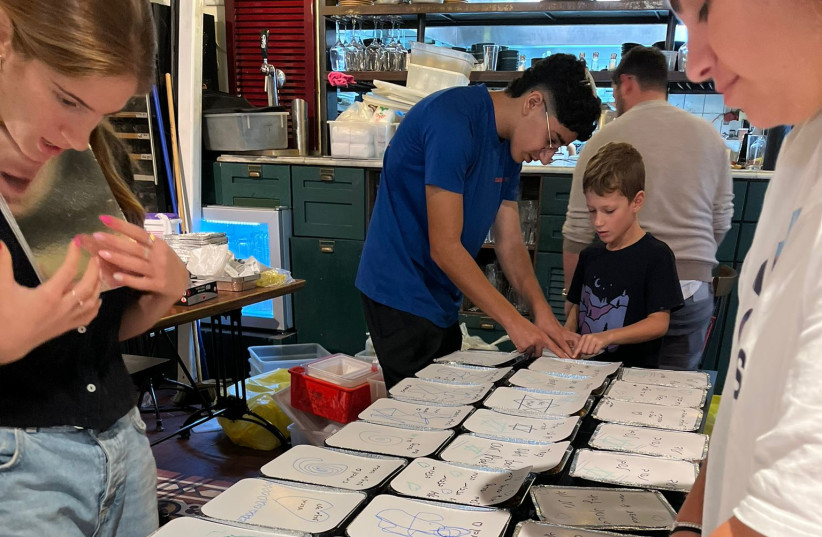After her husband left abruptly to join his army unit, Meytal Blumenthal Gordon realized she still hadn’t disassembled her sukkah, the temporary structure the family put up during the Sukkot holiday at their home in Jerusalem. She wasn’t physically capable of doing so alone.
“Two sweet boys, teenagers, came and they took down the sukkah and helped me organize it,” Blumenthal Gordon said. “We actually had a siren in the middle. We all ran to the shelter, and then they continued helping.”
It wasn’t the only time that neighborhood teens have stopped by to help Blumenthal Gordon in the weeks since Hamas’ October 7 attack on Israel plunged the country into war. They have also brought her boxes of food and helped her with her two children, a 5-year-old boy and a newborn daughter.
It’s all part of an abrupt and notable shift in a country that uniquely refers to school-aged teens as being in “the stupid age.” In ordinary circumstances, Israeli teens are not assigned many responsibilities before they graduate from high school, in a nod to the fact that most will enter compulsory military service soon after turning 18, cutting short the extended adolescence that many of their peers in other countries enjoy.
But since war began earlier this month, most young Israeli men and some women have been drafted into military service. With schools closed until recently, teens have been uniquely positioned to step into the gap.

Thousands of teens have been organizing independently and through youth groups to volunteer to babysit, dismantle sukkahs, prepare food for soldiers and stock refrigerators. Some have even been digging graves.
Youth group buildings have become shelters for those displaced from the south, near Gaza, and groups of teens have been organizing donations of food and other essentials.
“It brings the whole nation together, especially in times like these,” said Hallel Heller, a ninth-grader from Jerusalem who spent the first week of the war packaging meals for soldiers.
Each according to their ability
Other teens, like Shefer Zimran, 14, who hails from the West Bank city of Efrat, are helping younger children affected by the war. Together with friends from her neighborhood, Zimran handed out bags of candy and art supplies to children who are home from school in her community. Zimran later sent videos of art projects to keep the children busy. Zimran knew that mothers whose husbands had been drafted had trouble keeping their small children occupied.
“It is important, now more than ever, to help people in need,” Zimran said. “And we have free time and the ability to help.”
Odelia Kaye, 16, from Jerusalem, has been offering practical and emotional support for mothers who are now caring for young children on their own. “Sometimes they’re alone and it’s really difficult to take care of kids by yourself,” she said.
In addition to playing with children, washing dishes, cleaning up and folding laundry for mothers on their own, Kaye has found that what is sometimes most appreciated is the company.
“I feel like the more I’ve done it, the more I’ve learned about how difficult it is for some of these moms who have really small children, including young babies, a couple of months old,” said Kaye. “These moms need emotional support. It’s easy to feel alone and it’s important for me to make sure that these people know that they’re not alone and that I’m there to help.”
Blumenthal Gordon said she is accustomed to being alone because her husband, a physician, is often away for extended periods, so it’s not just the loneliness that local teens help her battle.
“Emotionally, it’s very different,” she said. “I’m so worried about my husband, we’re constantly running to a shelter, and the energy is really low. Having the teenagers over gives good vibes.”
